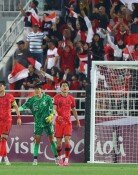N.K.'s ICBM launch sparkiing paradigm shift on Korean Peninsula
N.K.'s ICBM launch sparkiing paradigm shift on Korean Peninsula
Posted July. 05, 2017 07:06,
Updated July. 05, 2017 07:19
North Korea announced Tuesday that it successfully launched an intercontinental ballistic missile. “We are a robust nuclear powerhouse that possesses the strongest intercontinental ballistic rocket that can strike any parts of the world, along with nuclear weapons,” Pyongyang said. It requires verification whether the ICBM also succeeded with technology for reentry into the atmosphere of a miniaturized nuclear warhead as the North claims, but the emergence of a "North Korea possessing ICBM" that follows a "North Korea possessing nuclear weapons" represents a paradigm shift in the geopolitical situation on the Korean Peninsula and calls for a fundamental change to corresponding response.
The South Korean and U.S. authorities have predicted that it will take until the end of President Trump’s term in office or at least one year for the North to complete the development of ICBM. Of course, the authorities cannot unconditionally construe Pyongyang’s claim as actually meaning the completion of ICBM, but the two allies need to reflect upon whether they have been taking the situation too lightly. Notably, President Moon Jae-in also need to reconsider his perception that was revealed in his remarks that “(Kim Jong Un) has ‘ostensibly bragged’ with nuclear weapons and missiles.”
The North has made the latest provocation on Independence Day of the U.S., and the 45th anniversary of the July 4 Inter-Korean Joint Statement and just three days after the Seoul-Washington summit. Notably, Pyongyang responded with a grave provocation only a day after President Moon warned the North, “Now is probably the last chance for North Korea to open the window for dialogue.” Pyongyang already blasted Seoul through its state agency for South Korea affairs, saying, “(He) visited his superior in the U.S. and displayed all different shameful conducts,” calling Moon’s visit to the U.S. "reverence of America" and "submission to the U.S." From now, the North will seek to bypass the South and pursue a direct deal with the U.S., while Washington could start negotiations with Pyongyang in the face of immediate threats.
"A North Korea possessing ICBM" is evidence that all North Korea policies that were created under the assumption that the North could give up the development of nuclear weapons is "wishful thinking" based on fantasy. The leaders of South Korea and the U.S. said in their joint statement "If North Korea takes the right path, we are ready to provide the North with a brighter future together with the international community," in urging Pyongyang to return to the negotiating table. However, the Kim Jong Un regime already identified itself as a nuclear power in its Constitution. The dismantlement of the North’s nuclear weapons was a goal that was impossible to achieve.
A bigger problem is that escalation of the North’s threat could immediately lead to a constant crisis on the Korean Peninsula. The U.S., which has considered the North’s nuclear weapons and missiles "the most apparently, urgent, biggest and highest priority threat," could bring the Korean Peninsula to a crisis by imposing the heaviest military pressure on the North or isolate the South through the highest degree of engagement in which it makes compromise with Pyongyang only in return for freezing of the North’s ICBM development. After all, South Korea could face a situation wherein it can be uncontrollably affected and swayed by the North’s threat, let alone taking the lead in inter-Korean relations that President Moon emphasized.
The South should also counter the North’s threat through its commitment to self-defense on the domestic front in tune with a shift of security paradigm on the Korean Peninsula. Seoul can no longer afford to only reply on Washington’s deterrence of nuclear proliferation to counter the North’s escalated nuclear threat. The South should display decisive response by adopting a new security regime, including redeployment of tactical nuclear weapons, development of potential for nuclear armament, and expansion of capability to thoroughly revenge and retaliate for the North’s provocations. In the wake of a paradigm shift in the geopolitical situation on the Korean Peninsula, Seoul should reformulate its North Korea policy as well.
Headline News
- Med professors announce intention to leave hospitals starting Thursday
- Bridge honoring Sgt. Moon Jae-sik unveiled in Pennsylvania
- Chief of Staff Chung tells presidential secretaries to stay away from politics
- US FTC bans noncompete agreements
- N. Korea launches cyberattacks on S. Korea's defense companies







